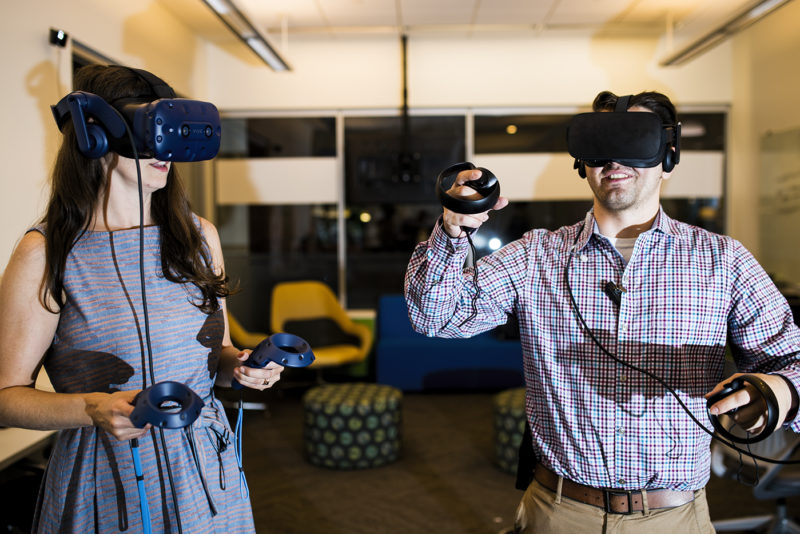That’s the case at Northeastern’s Center for Cognitive and Brain Health. The goal of the center, according to Rachel Hopman, a postdoctoral research associate in the lab, is to examine “how physical activity and healthy lifestyle behaviors have a day-to-day role in our general cognitive abilities.”
Alumnus of Northeastern’s game design program applies video game experience to psychology research
When Ruiming Wang realized his virtual reality skills could improve people’s lives, he had one thought: “I’m in.”
Wang, who recently graduated from Northeastern’s Master of Science in Game Science and Design program, grew up playing video games in Beijing, China. After he discovered that many of his favorites were made in the United States, he decided to apply to Northeastern’s game design program in Boston.
“However,” he says, “the more I learned about virtual reality, the more I found out that virtual reality is not only about entertainment.”
But one particular study at the center pushes that one step further. Under the direction of psychology professors Art Kramer and Charles Hillman, the project combines physical activity with green space. As it turns out, the trick to making this work within the urban confines of Northeastern’s Boston campus was tucked inside the College of Arts, Media and Design.
“Since we are working on virtual reality,” Wang says, “they need someone like me.”
To bring the project to life, Wang designed a fictional island where exercise and the outdoors convene. And by strapping each research participant into a harness and letting them walk around on an omnidirectional treadmill—“like the one from the movie Ready Player One,” says Wang—researchers are able to study how these participants perform on tasks that they encounter while inside this world, such as remembering a random code or being asked to follow certain instructions while ignoring others.
Participants hold a compass and map in their computer-generated hands, and, engulfed by surround-sound bird chirping and cooled by “wind” from nearby fans, they navigate to checkpoints alongside the beach or nestled between steep hills that they actually have to exert themselves to mount. (The trick, Wang says, is manipulating the maximum speed a participant can reach when faced with a virtual elevation change.)
Previous studies show that physical activity improves cognitive ability, Hopman says. Plus, she adds, “just seeing a nice sunny day with trees and forests and plants influences our overall mood, which could have an influence on our cognitive behaviors.”
The natural next step was to combine and study both physical activity and the outdoors using virtual reality—and there doesn’t seem to be an end in sight for applications that make a positive impact, even now that Wang has transitioned from graduate student to graduate.
“It’s not just an entertainment device anymore,” says Wang. “It’s something that can make people feel better.”
For media inquiries, please contact media@northeastern.edu.
Last Updated on August 6, 2019

